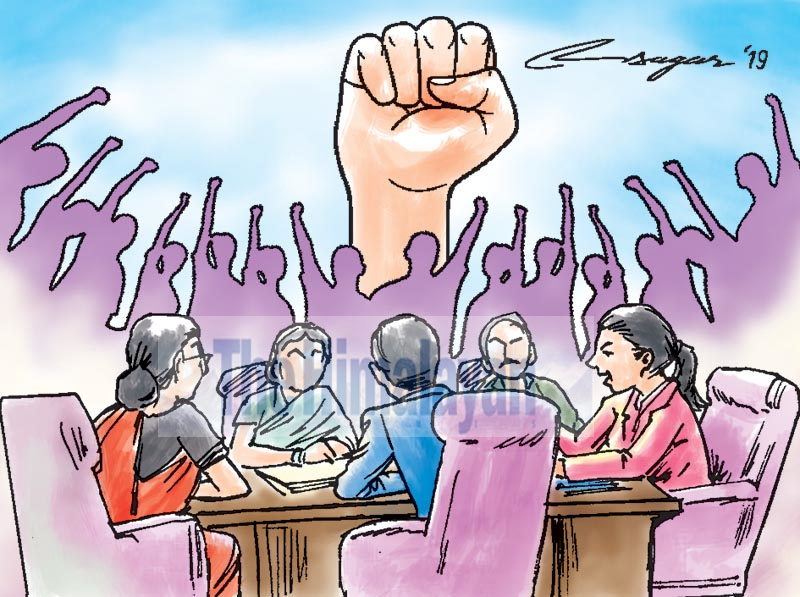War of words: Sounds and shouts without meaning
The title of this write-up alludes to Shakespeare's words "Life is a tale told by an idiot full of sound and fury signifying nothing" in Macbeth (1606), which often echo to my mind when I hear the roaring shouts of Nepali political leaders. The cacophony of their sounds which produce very little meaning for the sake of the nation has nevertheless impacted heavily upon the minds of the general people. As linguists claim, words have the power to produce illocutionary effects on the hearers no matter whether positive or negative.
Consumed by terrible ambition that is triggered by the prophecy of a trio of witches and spurred to action by his wife, General Macbeth does the sacrilegious act by secretly killing King Duncan against the sanctity of his virtue. But he cannot sustain what he does and in no time miserably falls victim to his undoable deed. Wracked by his sense of guilt and paranoia he happens to murder many more people, who he thinks suspect him to be the murderer of Duncan. Yet he feels he cannot wash away the blood begotten by the sinful murder of his own kinsman even with the water of the entire ocean. Finally when his wife turns into madness and miserably ends her life, Macbeth succumbs to utter disillusionment. So he finds life as a tale full of sounds and fury signifying nothing.
It does not necessarily mean, however, that Nepali contemporary politicians are driven by Macbethean type of ambition. But one thing is certain, they are engaged in making loud noises, saying this is right and that is wrong without properly knowing what exactly is right. A large number of cadres blindly follow what their leaders say. To some extent, it can be called natural. But even the influential leaders are often inconsistent in their words and deeds. If we closely look at the Nepali political discourse, then we find that even the same leader has changed his voice, saying his views are in accordance with the Nepali context. This article seeks to shed some light on the theoretical aspect of how language can be used by skillful speakers, including politicians, to hide the truth and/or tell lies to serve their interests.
Just as language can be used to express the truth so it can equally be used to hide it. As a matter of fact, no language can represent "the way things are". As Daniel Chandler (2002) says, "Language is not a neutral medium “to express the thing truly. A crafty speaker can manipulate the truth by using this potential of language. The careful speakers can put their interests in what they say in a subtle manner without the audience's knowing. They say one thing on the surface but they mean something else in a deeper level. We often tend to believe in the literal without trying to unearth the things beyond the literal.
In many cases people like to hide the truth when they say something unpleasant. Even as the unpleasant things are to be exposed, they are done in a different manner so that the hearers' feelings are not hurt. We don’t need to go far to seek examples. Literary writers use various figures of speech, such as simile and metaphor, to make their expressions look pleasant and beautiful. Hiding the truth in this sense is an acceptable practice. The eloquent political speakers like to persuade people by using polite forms of language but hide the unpleasant truth to please their audience.
If somebody can hide the truth by means of language, the same potential of language can be used to tell lies also. It is mostly the swindlers who tell lies to deceive the innocent ones to serve their interests. Many speakers have their ulterior motive which they can easily hide under the guise of rhetoric. There is a well known joke about politicians:
Question: How can you tell whether a politician's lying?
Answer: You can see their lips move.
Offensive though this joke is to politicians, some critics have resorted to it oftentimes. George Orwell (1946) argues that language of politics is largely the language of deception. He perceives the majority of politicians to be corrupt confidence swindlers and says, ". . . political language - and with variations this is true of all political parties, from Conservatives to Anarchists - is designed to make lies sound truthful and murder respectable, and to give an appearance of solidity to pure wind". As piercing as arrow-like Orwell's words are, they are nevertheless as compelling as relevant to the politicians of all times in all places.
Some aggressive speakers would like to use in their speech the words as piercing as the arrows to hit humans. They are engaged in accusing their fellow travellers of being traitors who they earlier thought were great heroes. What more powerful words can there be than these catchwords to rouse the innocent people to action? The difference in their sayings and doings has shown that "traitor" and "hero" are the favourite terms frequently used by politicians to serve their own interests.
Even the revolutionary leaders, albeit not hurting each other literally for the sake of power, have always been engaged in the war of words to gain the seat of power and unseat the other. Among others, the very recent word quarrel of CPN apex leaders, not to mention earlier ones, can be taken as an example of word feud replete with sounds and shouts without essential difference in meaning. Macbeth eventually learned that ambition is hollow and power is meaningless at the cost of life, but Nepali leaders do not yet seem to learn lessons from their mistakes they made several times in the past.
Dhamala is a professor of English, TU






